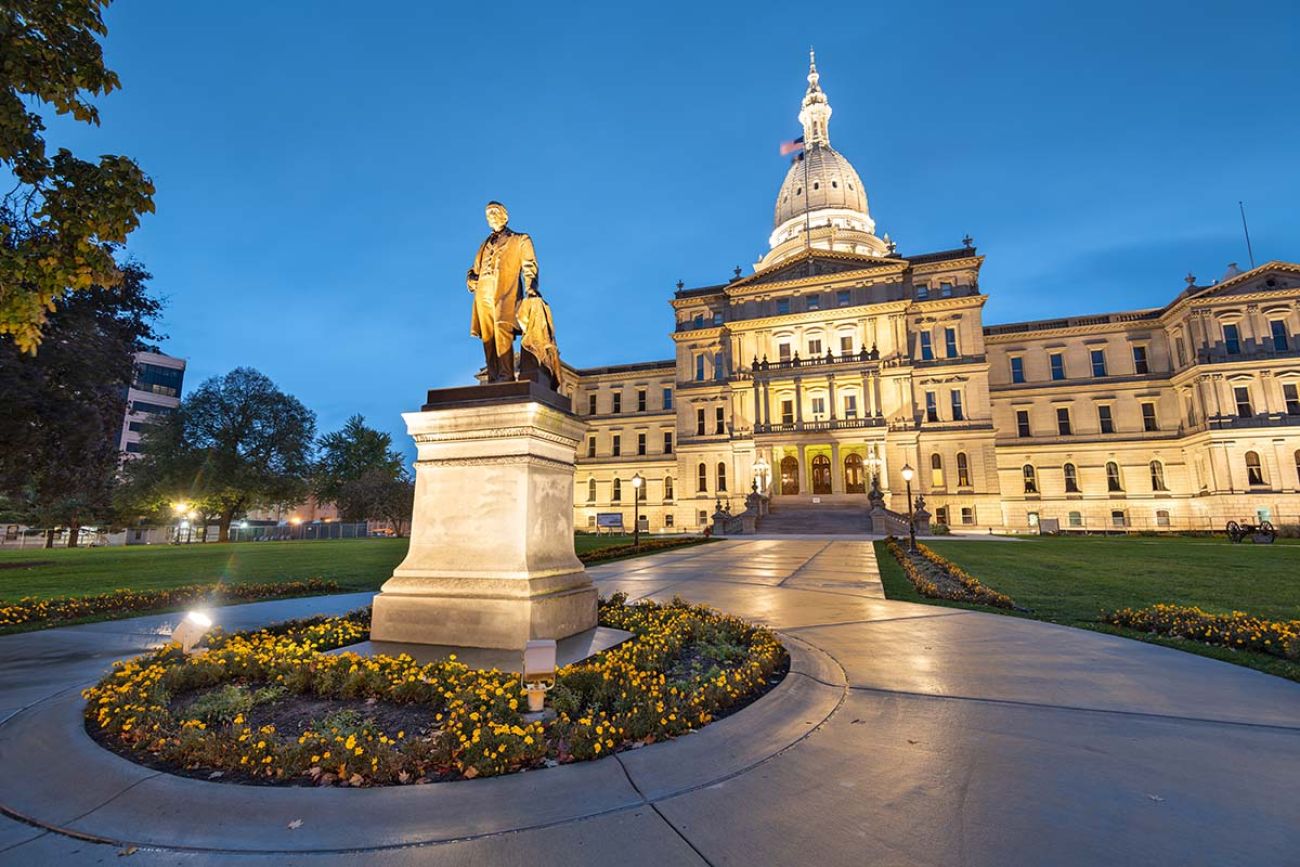Bill barrage: Michigan lawmakers pass ‘Taylor Swift’ bot ban in summer rush

- The Michigan Legislature worked through a marathon 19-hour session to finish the state budget early Thursday morning
- Lawmakers approved plans to ban ticket bots and bar a ‘gay panic defense’ for alleged crimes, among other things
- Some bills stalled before summer break, including proposed tax breaks for data centers and the film industry
LANSING — Michigan lawmakers didn’t just pass an $83 billion budget early Thursday, they also approved nearly 100 other bills during a marathon 19-hour session before finally breaking for summer recess.
Some of the bigger policy changes, such as opening the Legislature and governor’s office to Freedom of Information Act requests and expanding unemployment benefits to 26 weeks, made immediate headlines.
But other policy proposals passed more quietly in the night.
That included bills to bar a “gay panic defense” for alleged crimes, expand the state’s statute of limitations to bring charges for certain sex assaults and a bipartisan plan to deter bots from boxing out fans attempting to buy tickets to performers like Taylor Swift.
But other policy goals were also left on the table: Lawmakers were unable to reach a consensus on proposed tax credits for data centers or plans to revive incentives for in-state film and television projects.
Here’s a look at what passed — and what stalled — this week in Lansing:
The ticket bot era
Michigan lawmakers are hoping to stop ticket bots from shutting fans out of popular concerts under bipartisan “Taylor Swift bills” approved by the state House.
The plan from state Reps. Mike McFall, D-Hazel Park, and Graham Filler, R-Duplain Township, would create a maximum $5,000 civil fine per ticket for individuals or companies who use or create ticket bots to buy tickets to Michigan entertainment events.
Related:
- Michigan’s $83B budget deal boosts housing, scraps Whtimer’s trash fee hike
- Michigan’s $23B education deal: Free community college for all, pre-K for many
- Government transparency plan passes Michigan Senate — which had been roadblock
In rolling out the legislation, they cited Swift’s Eras Tour, where Ticketmaster presale tickets were sold out within minutes and were often listed on resale sites for thousands of dollars.
The legislation, now headed to the Senate for further consideration, would also enable the Michigan Department of Attorney General to bring civil action to stop a person suspected of using bots for ticket purchases and recover fines.
Both bills in the package won wide and bipartisan support, passing the chamber 106-4 and 98-12, respectively.
“By imposing penalties on those who use these unethical tactics, we are protecting genuine buyers and ensuring everyone has an equal chance to enjoy live events,” McFall said.
‘Gay panic defense’ ban
After a bipartisan vote from Senate lawmakers last week, House Democrats signed off on changes to legislation that would bar people from using what’s known as a “gay panic defense” to try and justify assaultive crimes.
The plan now moves to the governor’s desk for her signature.
The term arose following the death of Matthew Shepard, a gay man murdered by two individuals in 1998. His attackers claimed they were so alarmed upon learning of Shepard’s sexuality, afraid he might make advances on them, that they beat him so severely he later died from his injuries.
If signed by Whitmer, the legislation approved Thursday would ban people from claiming in court that their use of force against another was justified after learning of that person’s actual or perceived sexual orientation, or their actual or perceived gender identity.
Medically frail prisoner parole heads to gov
Seriously disabled or terminally ill inmates could have a shot at leaving prison early after legislation that would expand medical parole access passed the state House Wednesday.
The Senate, which had passed a prior version, approved House changes and sent the bill to Gov. Gretchen Whitmer’s desk for potential signature.
Michigan law does already allow medical parole, though it has been scarcely used since — paroling just one individual since taking effect in 2019. What passed Wednesday, however, would expand medical parole options and enable people with less than 18 months to live to qualify for parole.
It also would allow people with specific physical or neurological degenerative diseases — such as dementia or Alzheimer's — to be paroled and either placed in some form of medical care, or with their family.
This would only occur if a parole board, and a Michigan Department of Corrections doctor, decides a prisoner qualifies for this kind of parole.
Landlord income discrimination ban
In party line votes early Thursday, the Democratic-led House approved legislation preventing landlords from discriminating against renters based on their source of income.
Under the proposal, landlords with five or more rental units could not deny renters from becoming tenants should they use alternate sources of income such as housing assistance vouchers or veterans’ benefits.
Those types of income assistance “should be considered legitimate sources of income,” said Rep. Jennifer Conlin, D-Ann Arbor, who sponsored part of the legislative package.
“Affordable housing is harder and harder to come by,” she said, “and it is crucial that we protect tenants’ rights with regard to the income they are receiving.”
If a violation of the law occurred, tenants could bring a civil claim against their landlord for damages or seek a court order to stop their eviction or denial of payment.
While acknowledging Michigan was experiencing a crisis regarding affordable housing stock, Rep. Andrew Fink, R-Hillsdale, said he didn’t believe the bills “would solve the problem, and would instead be counterproductive.” Instead, he said it was crucial to tackle how expensive homebuilding is in Michigan.
The state Senate previously approved part of the package, but because of House changes, the upper chamber must vote again before the legislation reaches the governor’s desk. Two other House bills still await Senate action.
State-based health exchange
In the Senate, Democrats approved bills along partisan lines that would establish a state-based health insurance exchange under the Affordable Care Act, also known as Obamacare.
The bills would shift the state away from the federal health insurance marketplace to a state-based exchange, which supporters called a “logical next step” for offering more flexibility on health care coverage.
“Under this plan, we will have more tools at our disposal to tailor the marketplace to fit local healthcare needs while reducing costs, improving efficiency, and boosting access to care,” Sen. Kevin Hertel, chair of the Health Policy Committee and lead sponsor of the package, said in a statement.
Under the Affordable Care Act, states can use the federal insurance marketplace or create and manage their own state-based exchange. Eighteen states and Washington, D.C. currently operate individual exchanges.
Michigan officials opted to use the federal exchange after Republican legislators in 2011 blocked creation of a state program. On Wednesday, Senate Republicans unilaterally opposed the plan to create a state-based exchange.
The legislation would need House passage and Whitmer’s signature to become law. If passed as is, the exchange would go live in 2026.
Sexual assault statute of limitations extended
A trio of bills eliminating the statute of limitations on second- and third-degree sexual assault crimes advanced through the House around 2 a.m. Thursday.
Under the package, a person could be indicted for second- and third-degree sexual assault at any time, regardless of their alleged victim’s age at the time of offense.
The proposal would also stop public universities, colleges and school districts from claiming governmental liability for negligence when it comes to criminal sexual conduct claims.
The legislation now moves to the Senate for further consideration.
The legislative push began following the 2018 following the conviction of Larry Nassar — a former U.S. women’s gymnastics team doctor and ex-Michigan State University physician who sexually assaulted hundreds of girls and women under the veil of medical treatments.
Legislation enacted that year extended the statute of limitations for sexual abuse survivors – but only for a limited time. Current law allows victims to take action until they turn 28 or until three years after they discovered they were assaulted.
The average age for a child sexual abuse survivor to report their abuse is 52 years old, according to a 2014 study of 1,050 survivors, as many children either cannot articulate or lack the knowledge to understand they were sexually assaulted.
Supports for expectant moms OK’d
A House package aimed at reducing maternal mortality rates garnered bipartisan support Wednesday.
Taken together, the bills establish state guidelines for prenatal care, require insurers to provide coverage for mental health screenings and hospitals to give parents information on insurance enrollment if the newborn isn’t already covered.
Supporters of the plan hope that offering more support for expectant mothers and new moms would help reduce preventable deaths, especially among minority communities.
“When moms are healthy, babies are often born healthier,” Rep. Julie Rogers, D-Kalamazoo, told Bridge Michigan. “These bills go a long way towards preventing maternal morbidity rates and improving our outcomes for infants.”
Rep. Donnie Steele, R-Orion Township, said in a statement that she hopes the plan will “shine a light on prenatal and postpartum health care” and offer better outcomes for expecting mothers and their kids.
Stalled: Tax breaks for data centers
While Democrats in the House and Senate were able to pass many items on their policy wishlist late Wednesday, a few large ticket items were still left on the table as they broke for summer recess.
Lawmakers had been considering House bills to extend a key tax break aimed at luring multibillion-dollar data centers to the state, a controversial prospect after one company failed to deliver on initial job promises.
In 2015, Nevada-based Switch promised to create 1,000 jobs and investment totaling $5 billion by building a data center in the 663,671-square-foot former Steelcase furniture company building in Gaines Township.
Instead, Switch had created only 26 jobs by a 2022 deadline. But as Bridge recently reported, Michigan quietly retooled the detail, allowing the company to continue saving an estimated $1 million per year.
Some states discontinue tax breaks for companies that underperform.
A package under consideration in the House and Senate would expand an existing sales tax exemption that was initially created at Switch’s behest, allowing tax breaks through 2035 for so-called colocation data centers.
The bills would also expand eligibility to large enterprise data centers, which are owned and operated by a single company, while pushing the sunset date to 2050 (2065 for facilities built on a brownfield).
Bill sponsor Joey Andrews, D-St. Joseph, recently told Bridge the plan would provide new opportunities for former major manufacturing centers.
The legislation was queued up for votes on the House floor this week, but was pulled from the agenda amid criticism from environmental groups who fear more data centers would drain Michigan’s water and electricity supply.
Stalled: Film credit revival
Lawmakers also left a plan to revive incentives for in-state film and television projects on the cutting room floor.
House and Senate legislation introduced last summer would create a transferable tax credit for Michigan-based multimedia projects, ranging from traditional film and television productions to other work, such as commercials, corporate media and music videos.
The previous rebate program attracted large-scale projects like “Transformers” and “Batman v. Superman” but shuttered in 2015 amid criticism that the return on investment for taxpayers was minimal.
Unlike the previous program, which offered rebates of up to 42% of filmmakers’ in-state production costs, the latest plan would allow eligible companies to get back up to 25% of total spending in tax credits for filming in Michigan and up to 30% if the project incorporates the Pure Michigan logo and other Michigan film industry affiliates, capped depending on the length and duration of the project.
Critics argue that any benefits stemming from film incentives aren’t worth the trade-off of losing out on tax dollars.
Influential education groups — including the Michigan Association of School Boards, AFT Michigan, the Michigan Education Association and the Michigan Association of Secondary School Principals — raised concerns that the plan would further erode tax revenues used to fund K-12 schools.
“We have continually opposed tax policies that create any cut to revenues to our schools,” the groups wrote this week in a joint letter to lawmakers, calling for a “more comprehensive conversation” on tax policy to ensure long-term, stable funding for schools.
See what new members are saying about why they donated to Bridge Michigan:
- “In order for this information to be accurate and unbiased it must be underwritten by its readers, not by special interests.” - Larry S.
- “Not many other media sources report on the topics Bridge does.” - Susan B.
- “Your journalism is outstanding and rare these days.” - Mark S.
If you want to ensure the future of nonpartisan, nonprofit Michigan journalism, please become a member today. You, too, will be asked why you donated and maybe we'll feature your quote next time!




